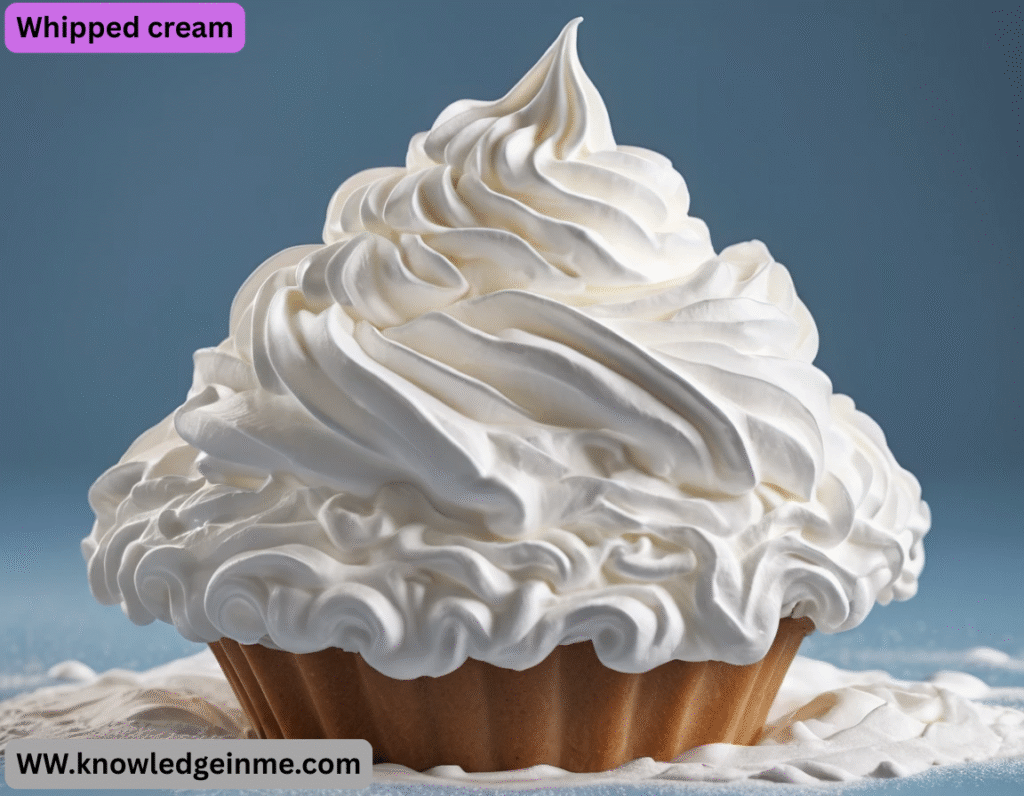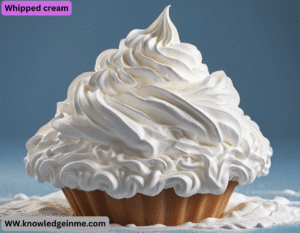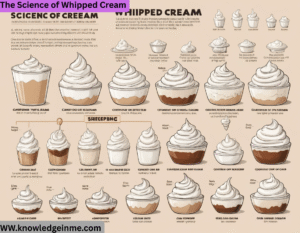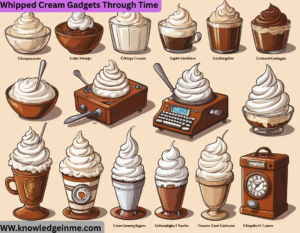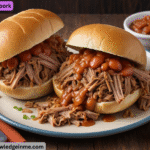Whipped cream Whipped cream is a light, airy foam made by whipping heavy cream (or double cream) until it becomes fluffy and holds its shape. It’s sweetened with sugar and sometimes flavored with vanilla, making it a popular topping for desserts, drinks, and fruits.
How to Make Whipped Cream
Ingredients:
- 1 cup (240ml) cold heavy cream (at least 30% fat)
- 2–3 TBSP powdered sugar (or granulated sugar)
- 1 tsp vanilla extract (optional)
Steps:
- Whip the cream – Pour cold cream into the bowl and beat on medium speed until it starts to thicken.
- Stop at the right consistency – Whip until soft peaks form (for a creamy texture) or stiff peaks (for piping).
Uses for Whipped Cream
- Topping for pies, cakes, hot chocolate, or coffee (like Starbucks’ whipped cream)
- Filling for cream puffs, eclairs, or trifles
- Layered in parfaits or milkshakes
- Served with fresh berries or pancakes
The Science of Whipped Cream
- Fat is key: Heavy cream needs at least 30% fat to hold air bubbles. Lower-fat creams (like half-and-half) won’t whip.
- Temperature matters: Cold cream (and tools!) whip faster because fat molecules solidify and trap air better.
- Overwhipping = butter: If whipped too long, the fat separates from the liquid (buttermilk), turning into butter.
Stabilized Whipped Cream For Longer-Lasting Results
- Regular whipped cream deflates after a few hours. To stabilize it:
- Cornstarch: Add 1 tbsp powdered sugar + 1 tsp cornstarch per cup of cream.
- Cream cheese/Mascarpone: Fold in 2 tbsp for a rich, pipeable texture.
Flavor Variations
- Coffee: Mix in 1 tsp instant espresso powder.
- Citrus: Add zest from 1 lemon/orange + 1 tbsp liqueur (like Grand Marnier).
- Spiced: Cinnamon, nutmeg, or pumpkin pie spice for fall desserts.
Dairy Free & Vegan Options
- Aquafaba: Whip chickpea brine (3 TBSP) + 1 TBSP sugar for a foam-like topping (less rich but airy).
Troubleshooting
Issue Cause Fix
Cream won’t thicken Warm cream/low-fat cream Chill bowl/cream; use 35%+ fat
Grainy texture Overwhipped (starting to turn to butter) Stop whipping; fold in 1 tbsp fresh cream
Runny/watery Under whipped or separated Re-whip or strain liquid
Advanced Tips
- For ultra-stiff peaks: Use a chilled metal bowl and hand mixer (more control than a stand mixer).
- No mixer? Use a whisk, jar (shake vigorously), or even a fork (takes longer but works!).
- Pipe like a pro: Use a star tip for swirls on cupcakes or a plain tip for elegant dollops.
Creative Uses Beyond Desserts
- Savory twist: Omit sugar, add salt, garlic, or herbs as a topping for soups (like pumpkin bisque).
- Whipped cream “cheese”: Fold in goat cheese for a tangy spread.
The History of Whipped Cream
- 1600s: Aristocrats used birch twigs to whip cream by hand (a tedious process!).
- 1920s: Mechanical mixers popularized whipped cream for home bakers.
The Physics & Chemistry Behind Whipping
- Air bubbles: Whipping introduces tiny air pockets, stabilized by fat globules in cream.
- Fat clusters: As you whip, fat molecules clump together, forming a network that traps air.
- Overwhipping breaks the emulsion, causing fat to separate (butter) and liquid (buttermilk) to leak out.
- Pro Tip: Cream whips best at 4–10°C (39–50°F). Too warm = collapses; too cold = hard to aerate.
Global Whipped Cream Variations
Country Name Unique Twist
Italy Panna montata Often sweetened with mascarpone for tiramisu.
France Crème Chantilly Strictly vanilla + sugar (named after Château de Chantilly).
Japan Fresh Cream Ultra-light, less sweet, used in fluffy pastries.
Mexico Crema batida Sometimes spiked with cinnamon or rum.
Next-Level Whipped Cream Hacks
Flavor Infusion
- Steep cream with lavender, tea leaves, or citrus zest overnight, then strain and whip.
- Add melted white chocolate (1:4 ratio) for a silky, stable whipped ganache.
Texture Tricks
- For extra volume, add 1 tsp unflavored gelatin (dissolved in cold water) before whipping.
- Reverse whipping: Start at high speed to incorporate air fast, then slow down to refine texture.
Savory Applications
- Truffle whipped cream: Fold in truffle oil + parmesan for steak toppers.
- Wasabi whipped cream: A dollop on sushi or grilled fish.
Whipped Cream in Modern Mixology & Plating
Cocktails:
- Espresso Martini – Floating whipped cream + cocoa dust.
- Irish Coffee – Thick cream layered over whiskey-laced coffee.
Plating Techniques:
- Quenelle: Use a warm spoon to shape elegant oval dollops.
- Foam: Blend whipped cream with fruit purée for a light mousse.
Whipped Cream Gadgets Through Time
- 1800s: Hand-cranked whisk (“FOUAT”).
- 1930s: First electric mixer (Sunbeam Mixmaster).
- 2020s: Nitrogen-infused whipped cream (used in molecular gastronomy for instant foam).
Fun Experiments to Try
Turn Whipped Cream into Butter:
- Add salt for homemade sweet cream butter.
Colored Whipped Cream:
- Use freeze-dried fruit powder (like raspberry or MATCHA) for vibrant hues.
- Avoid liquid food coloring (can destabilize foam).
Whipped Cream in Pop Culture
- “Pie in the face” gags (thanks to its fluffy, non-sticky texture).
- Starbucks’ “Puppuccino” (whipped cream for dogs—though dairy isn’t ideal for pups!).
The Physics of Perfect Peaks
Cream Fat Content Breakdown:
- 30-35% (standard heavy cream): Good for soft peaks, best for folding into mousses.
- 36-40% (European “double cream”): Holds ultra-stiff peaks, ideal for piping.
- <30% (light cream/half-and-half): Will not whip (but can be “faked” with gelatin).
The Cold Hard Truth:
- Cream whips best at 4°C (39°F). Warmer = weak foam; colder = slow aeration.
- Metal bowls chill faster than glass/plastic. Pro chefs often freeze bowls 30 mins pre-whipping.
The Sugar Effect:
- Powdered sugar (with cornstarch) stabilizes better than granulated.
- Adding sugar early = more dissolved sweetness; late = more volume.
Industrial vs. Homemade: The Nitrous Oxide Secret
- Aerosol cans (Reddi-wip): Use N₂O (nitrous oxide) to force air into cream instantly.
- Pros: Convenient, lasts months.
- Cons: Contains stabilizers (carrageenan), less fresh taste.
ISI Whippers chef’s choice
- Refillable canisters for fresh cream + N₂O—lighter texture than hand-whipped.
- Can infuse flavors (vanilla bean, citrus zest) directly in the canister.
Molecular Gastronomy Tricks
Methane Foam:
- Whip cream with liquid nitrogen (-196°C/-321°F) for instant, ultra-light foam.
- Used at El Bulli for “vanilla air” desserts.
Agar-Stabilized Cream:
- Heat cream with 0.2% agar, chill, then whip—creates a heat-resistant foam for hot desserts.
The Butter Threshold: How to Salvage Mistakes
- Stage 1: Overwhipped (grainy) → Add 1 tbsp cold cream, fold gently.
- Stage 2: Semi-butter → Keep going! Make cultured butter:
- Add 2% yogurt, let sit 12 hrs, then wash with ice water.
- Stage 3: Full separation → Strain for buttermilk (great for pancakes).
Whipped Cream in Savory Cuisine
- Foie Gras Mousse: Fold whipped cream into puréed liver for silkier texture.
- Soufflé Boost: Fold into cheese soufflés for extra rise.
- Potato Gratin: Top with parmesan whipped cream before baking for golden crust.
The Future of Whipped Cream
- Lab-Grown Cream: Startups like Perfect Day use fermentation to make animal-free dairy cream.
- 3D-Printed Cream: MIT’s “Digital Grocery” project prints edible whipped cream structures.
Pro Chefs’ Secret Weapons
- CREMEUX Stabilizer: A mix of gelatin + xanthan gum for shelf-stable whipped cream.
- Siphon Whipping: Use a cream siphon for lighter-than-air texture (no hand fatigue).
Extreme Whipped Cream Challenges
- Fastest Whipping: 18 seconds (world record, using liquid nitrogen).
- Tallest Peak: 62 cm (achieved with gelatin + cream stabilizer).
The Ultimate Whipped Cream Recipe Chef’s Version
Ingredients:
- 250ml cold heavy cream (38% fat)
- 30g powdered sugar + 1g xanthan gum (for stability)
- 1 tsp vanilla bean paste

